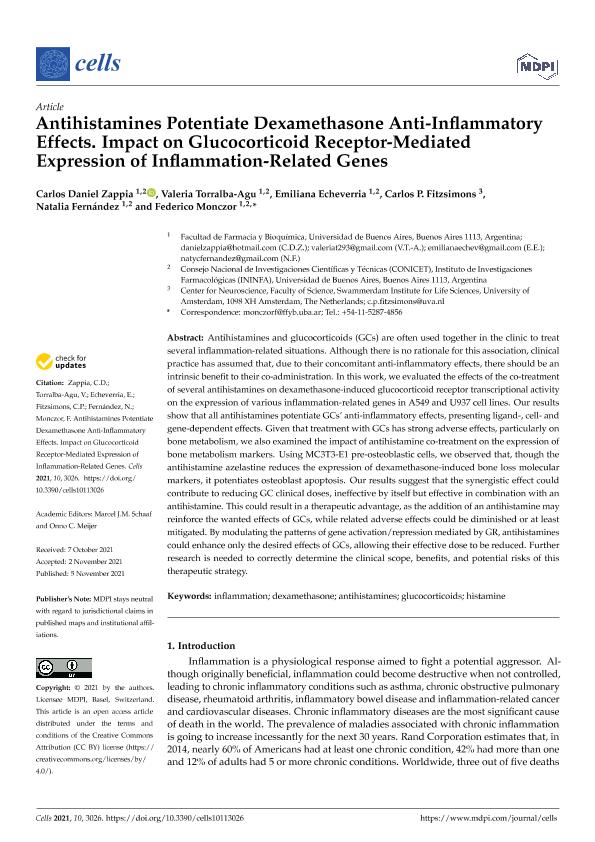Artículo
Antihistamines potentiate dexamethasone anti-inflammatory effects: Impact on glucocorticoid receptor-mediated expression of inflammation-related genes
Zappia, Carlos Daniel ; Torralba Agu, Valeria Nora
; Torralba Agu, Valeria Nora ; Echeverría, Emiliana Beatriz
; Echeverría, Emiliana Beatriz ; Fitzsimons, Carlos P.; Fernandez, Natalia Cristina
; Fitzsimons, Carlos P.; Fernandez, Natalia Cristina ; Monczor, Federico
; Monczor, Federico
 ; Torralba Agu, Valeria Nora
; Torralba Agu, Valeria Nora ; Echeverría, Emiliana Beatriz
; Echeverría, Emiliana Beatriz ; Fitzsimons, Carlos P.; Fernandez, Natalia Cristina
; Fitzsimons, Carlos P.; Fernandez, Natalia Cristina ; Monczor, Federico
; Monczor, Federico
Fecha de publicación:
11/2021
Editorial:
MDPI
Revista:
Cells
ISSN:
2073-4409
Idioma:
Inglés
Tipo de recurso:
Artículo publicado
Clasificación temática:
Resumen
Antihistamines and glucocorticoids (GCs) are often used together in the clinic to treat several inflammation-related situations. Although there is no rationale for this association, clinical practice has assumed that, due to their concomitant anti-inflammatory effects, there should be an intrinsic benefit to their co-administration. In this work, we evaluated the effects of the co-treatment of several antihistamines on dexamethasone-induced glucocorticoid receptor transcriptional activity on the expression of various inflammation-related genes in A549 and U937 cell lines. Our results show that all antihistamines potentiate GCs’ anti-inflammatory effects, presenting ligand-, cell-and gene-dependent effects. Given that treatment with GCs has strong adverse effects, particularly on bone metabolism, we also examined the impact of antihistamine co-treatment on the expression of bone metabolism markers. Using MC3T3-E1 pre-osteoblastic cells, we observed that, though the antihistamine azelastine reduces the expression of dexamethasone-induced bone loss molecular markers, it potentiates osteoblast apoptosis. Our results suggest that the synergistic effect could contribute to reducing GC clinical doses, ineffective by itself but effective in combination with an antihistamine. This could result in a therapeutic advantage, as the addition of an antihistamine may reinforce the wanted effects of GCs, while related adverse effects could be diminished or at least mitigated. By modulating the patterns of gene activation/repression mediated by GR, antihistamines could enhance only the desired effects of GCs, allowing their effective dose to be reduced. Further research is needed to correctly determine the clinical scope, benefits, and potential risks of this therapeutic strategy.
Palabras clave:
ANTIHISTAMINES
,
DEXAMETHASONE
,
GLUCOCORTICOIDS
,
HISTAMINE
,
INFLAMMATION
Archivos asociados
Licencia
Identificadores
Colecciones
Articulos(ININFA)
Articulos de INST.DE INVEST.FARMACOLOGICAS (I)
Articulos de INST.DE INVEST.FARMACOLOGICAS (I)
Citación
Zappia, Carlos Daniel; Torralba Agu, Valeria Nora; Echeverría, Emiliana Beatriz; Fitzsimons, Carlos P.; Fernandez, Natalia Cristina; et al.; Antihistamines potentiate dexamethasone anti-inflammatory effects: Impact on glucocorticoid receptor-mediated expression of inflammation-related genes; MDPI; Cells; 10; 11; 11-2021; 1-15
Compartir
Altmétricas



